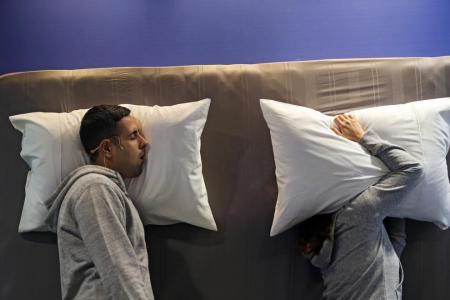Reasons behind your sleep farts and more
Director of SGH's Sleep Disorders Unit sheds light on your bedtime issues
Having a good night's rest is one of life's simple pleasures. Unfortunately, not everyone is able to achieve this dream sleep scenario.
Between snoring (or your partner keeping you up with their snoring), having weird dreams or even making awkward sounds, there is a lot that happens during our slumber time that many of us do not know much about.
Here are the answers to your burning questions on sleep.
Why do I find it hard to sleep sometimes? Do I have insomnia?
Not being able to doze off could be a result of a bad sleep schedule. Maybe you had too much screen time before bed or got carried away by your latest Netflix binge. Another possibility is you ate too close to bedtime.
You could be stressed about something that is keeping you awake, or perhaps you had a nap in the day and therefore find it hard to fall asleep at night.
These situations are different from having insomnia.
Clinical assistant professor Leow Leong Chai, director of the Sleep Disorders Unit at the Singapore General Hospital, said insomnia is defined as "having difficulties falling asleep or staying asleep, or waking up earlier than planned".
It is estimated that 15.3 per cent of people in Singapore suffer from insomnia.
He said: "Generally, chronic insomnia is when these problems occur at least three times per week for more than three months, and this is usually when seeking professional help is advised.
"For insomnia to be considered significant, there has to be some daytime symptoms, for example, feeling excessively fatigued or sleepy, low mood, lack of concentration, irritability or even hyperactivity or aggression."
I snore sometimes, does this mean I have sleep apnea?
There are many reasons why people snore, such as nasal/sinus problems, being overweight or the consumption of alcohol.
According to Prof Leow, who is also a senior consultant at the hospital's department of respiratory and critical care medicine, snoring is common and affects up to 50 per cent of the population, but there is a difference between snoring and sleep apnea.
He said: "Snoring is caused by turbulent airflow through partial narrowing of the upper airway during sleep. Sleep quality and oxygen levels are not adversely impacted.
"Sleep apnea, on the other hand, can be considered an extreme form of snoring due to severe upper airway obstruction leading to significant reduction in air going to the lungs - to the extent of causing reduction in oxygen levels in the body or causing recurrent disruptions to the sleep cycle.
"This can lead to short-term impairment in sleep quality, causing excessive daytime sleepiness and long-term adverse health effects such as high blood pressure, heart disease and stroke."
According to a survey by Jurong Health Services, one in three Singaporeans has moderate to severe sleep apnea, and one in 10 Singaporeans suffers from severe sleep apnea.
Those of Chinese and Malay ethnicity have higher rates of sleep apnea.
Prof Leow recommends seeking medical help if you or your bed partner notice loud snoring, choking spells during the night and significant sleepiness during the day, especially if the affected individual is also overweight or already suffers from high blood pressure or heart disease.
I drool in my sleep, is that normal?
It can be uncomfortable to have to wipe drool off your mouth area when you wake up. But Prof Leow said this should not be cause for alarm as our mouths continue to produce saliva during sleep.
Certain conditions can predispose you to drooling.
They include mouth breathing - which can be caused by nasal congestion or allergies, especially when sleeping on the side or prone (face down) - or conditions such as reflux, sleep apnea and chronic teeth grinding.
I have sex dreams. Am I the only one?
Regardless of who you are dreaming about, sex dreams are part and parcel of life.
"Dreams with sexual content are common and considered part of the normal human experience," said Prof Leow.
"Philosophers have theorised the meaning behind dreams since antiquity, but the most popular and relatively recent theory is from psychologist Sigmund Freud, who postulated that dreams are a manifestation of our unconscious desires and unfulfilled needs."
If you are more prone to erotic dreams when you are having your period, you are not alone. Hormonal fluctuations during the menstrual cycle may affect what you dream about, even though they might not always involve sex.
According to Prof Leow, many women do report "period dreams", which are vivid and sometimes bizarre dreams, though not necessarily sexual in nature, around the time of their periods.
Why do I walk or talk in my sleep?
Although sleepwalking and sleep talking are more common in children (most so in those aged one to four), some people never grow out of this habit.
Prof Leow estimated that 2 per cent to 4 per cent of affected people experience persistence of their sleepwalking or sleep talking.
People who sleepwalk do not know they are doing it and do not remember it when they wake up. Sleepwalking tends to run in the family, but you could also sleepwalk if you are sleep-deprived, stressed or have medical conditions such as a fever.
If your sleepwalking is dangerous - you reach for sharp objects or leave the stove on - see a sleep specialist.
Talking in your sleep is usually harmless, but you might need to seek help if you are constantly shouting in your sleep, as you need to find out what is causing your nightmares.
I fart in my sleep, why?
This is normal but most people do not even know this is happening as they are asleep.
Certain factors can increase your flatulence level, including a diet with excessive beans, cereals and cabbage, or medical conditions such as irritable bowel syndrome or inflammatory bowel disease.
"Dietary adjustments or seeking medical help for the above medical conditions can help to reduce flatulence," said Prof Leow.
I wet the bed while I was asleep. Why did this happen?
Even though bedwetting is something that happens mostly with children, you could wet the bed when you are a grown-up too. Prof Leow said it affects 1 per cent to 2 per cent of the population and mostly among the elderly.
"Potential causes are prostate issues, overactive bladder, urinary tract infections, sleep apnea and certain heart and kidney conditions.
"Certain medications such as diuretics can also cause bedwetting," he said.
If you are concerned about this issue, consult a medical expert.
Why do I groan in my sleep?
This is such a normal thing that there is actually a name for it - catathrenia. And it is characterised by deep inhalation, a pause and release with a long, sustained high-pitch throaty groan.
Prof Leow noted that the cause for it is unclear.
"A small proportion of people have a family history of catathrenia or personal history of sleepwalking, sleep talking or sleep apnea. This is generally a harmless condition and reassurance of the afflicted and the bed partner is often all that is necessary," he said.
Get The New Paper on your phone with the free TNP app. Download from the Apple App Store or Google Play Store now


